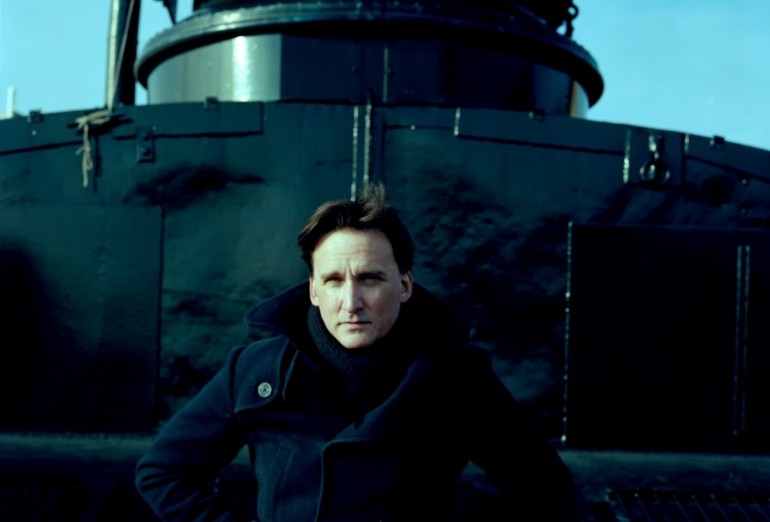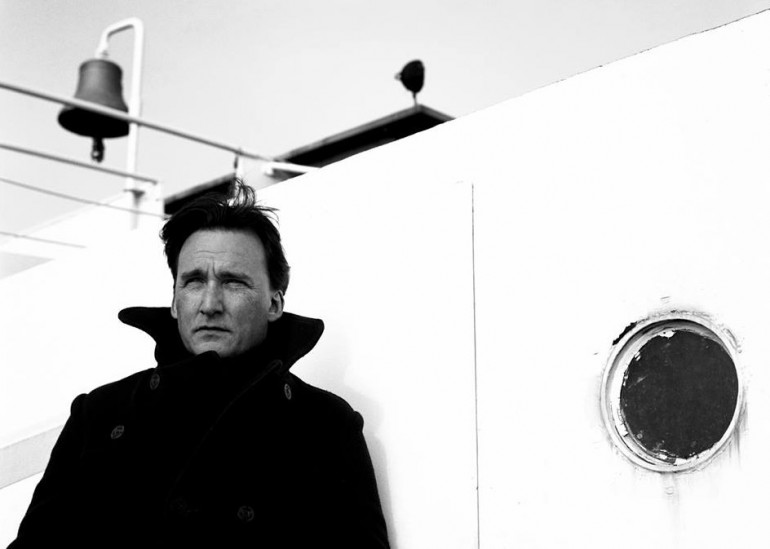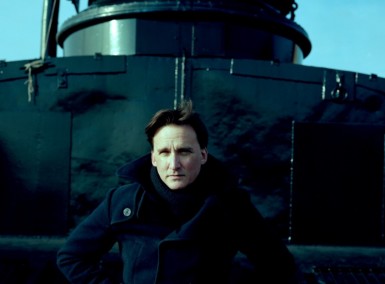
Photo by Philip Lethen
You know, it’s not an easy job to conduct an interview. It’s got nothing to do with experience or rules. No matter how experienced a journalist you are, you can never be sure of the outcome until the talk is completed. It’s the nature of the beast, really. The situation in which an interview takes place is as much artificial as it is odd. The interviewer wants to find out useful information that are, well, worth telling whereas the interviewee wants to sell a product. Very often it is the case that the latter answers the same questions over and over again within a short period of time or even within days. Then the journalist might feel a bit guilty for asking said questions. However, this needn’t always be the case. And then you’re lucky enough to share an experience that is constituted by three essential aspects: a place where you feel comfortable, two personalities set in this place and the chemistry between them.
In case of my interview with SOPHIA, I meet mastermind Robin Proper-Sheppard at Hallmackenreuther in Cologne. Of course, it’s not the somewhat difficult to pronounce name of the bar that will strike you most. The café is peacefully located next to a church and its entry is a bit unremarkable. Inside, the light is pleasantly dimmed and you find younger and older folks sitting on furniture that resemble the cup chairs of the 70s. They read magazines or newspapers, they talk. And it’s like you can read in everybody’s eyes: Don’t tell anyone about it. It’s a secret place for the adepts and you’re part of it. You belong here. In a way, it’s a bit of a nostalgic place. It’s been seven years since the last Sophia record came out. What follows, is more than an interview about SOPHIA’s new record As We Make Our Way (Unknown Harbours), it’s a sincere conversation about life.
An optimistic pessimist is making his way through life…
The man I only know as SOPHIA stands up and asks me what I would like to drink. Then he walks downstairs and orders mineral water. I’m pleasantly surprised by this rather unusual greeting. ‘I’m as much DIY as it gets’ says Robin. I wonder what he did during the past seven years and how it feels for him to be back in the business.
Robin: Well, I was living in Brussels and I’ve actually been producing a couple of Belgian and German bands. Also, I’ve always been writing songs but I didn’t feel that I had an album that actually said something about my life and said something about the bigger things around of me until now.
I mean I could have done a record five years ago but it would have just been a record for the sake of doing a record. And I can’t do that. I think the people who appreciate SOPHIA expect a little more than that.
I had finished It’s easy to be lonely and The Drifter and it felt like I had the two songs that kind of expressed really where I was in my life. I was still drifting, obviously. In It’s easy to be lonely the first verse ends ‘We’re the sum of our choices and the mistakes that we make’ and the second verse ends ‘We’re the sum of our choices and the chances we take’ and to me it was almost an epiphany that I could write something so positive. Although the song is called It’s easy to be lonely I think it’s a very positive song and I realised that what I was expressing had changed.
You mention an interesting point because when I was carefully listening to the record I had the impression that on the one hand you clearly tell of personal experiences and sort of your own life as we know this to be the case from previous records. But on the other hand it occurred to me that, possibly especially due to the choice of your words and formulations, you also observe what’s going on around you, referring to the fast-paced society we live in today as there are statements like ‘Everybody’s running from something’, ‘It’s all about the hustle’ and ‘I don’t know what we’re always resisting’. So, there’s not an exclusive ‘I’ but also a ‘we’ in the lyrics. Talking about the ‘I’ first and the new positivity that you discovered in your lyrics, has your view on life or your inner attitude somehow changed?
I have this kind of joke going on that I’m an optimistic pessimist, you know, and the thing is that a lot of times when I get, for example, into a relationship I’m asking a lot of questions. This is what Don’t ask is about. On the surface I’m telling myself I just want to know as much as I can about this person but there’s obviously something inside of me that thinks if I dig deeper and only deep enough I will uncover something that is dark and it’s going to upset me and gives me a reason to leave a situation which leads back to ‘I don’t know what we’re always resisting or what we’re even kicking against’.
Talking about Resisting in terms of the ‘we’ in the lyrics, is there anything we shouldn’t resist?
I think as time is going on we resist a lot of things. Sometimes we even resist things that we know are good for us simply because a lack of believe in ourselves and that’s also got to do with why so many relationships fall apart. I think if we didn’t resist everything all of the time, so much more positivity, so much more positive things in life could come out of it. That makes me kind of sound like a hippie although I’m not a hippie at all, you know. But I think we resist a lot.
Maybe we need to have a little more faith in our instincts and in our emotions.
That’s a beautiful message.
Yeah, I can say that, still I can’t say that I live it all the time.
‘It’s the first Sophia record I’ve ever done that isn’t just about me’
That’s got partly to do with my impression that you also comment on the fast-paced society and its side effect that we might probably resist too many things due to the vast number of opportunities and chances that we have. As a consequence we’re constantly questioning our actions, decisions, choices, basically our lives altogether. Sometimes I find myself questioning something particular only to find the bad in it. That’s why I lik and could well relate to the line ‘So don’t ask what you don’t want to know’ in Don’t ask. Also, as part of the story, we’re constantly on the run and on the go, we ‘hustle’ a lot though the days. That’s why I loved the anchor on your artwork for the new record. Is it like music can be one of the anchors of our lives? Something we can hold on to and rely on? I listened to your album shortly after the terrorist attacks in Brussels and although I was thinking about stuff it helped me to drift off.
Actually, I recorded the majority of the album twice. We had our first recording session back in 2014 and after that I threw away eight of the songs. Well, I re-recorded most of them because when I listened to them back then it didn’t allow me to do what you said this record did to you. You were thinking about what’s going on around you in your life and it kind of let you drift away and think about things that were going on around you. The music was kind of there and it influenced your feelings a bit but it didn’t steel your attention whereas the original recordings didn’t allow me to feel this way. You know, I would listen to them and I wasn’t able to drift off and I want to be able to do that with my own music as well. It felt like I kind of failed because if I can’t drift off to my music then how can I expect anybody else to drift off to my music? That’s really an important part of music. It should basically help you to free your thinking a bit and allow you to move in different directions.
I guess one of the reasons why I could also relate to the lyrics is that basically you have a clue what it is about as they’re personal lyrics but at the same time they appear to be a bit abstract when you sing verses like ‘I don’t know what we’re always resisting’ or ‘Everybody’s running from something’. So, you immediately start thinking …
… ‘what is my something?’
Exactly. And that’s the beauty in it.
I think that’s a big difference between this record and previous SOPHIA records. If you listen to the early albums you knew that I’d had my heart broken and that I’d been in a relationship and it is pretty much all there. And for this new record I was trying to find what I can sing about and what can I offer the people that they are going to be able to take into their own life. It’s the first SOPHIA record I’ve ever done that isn’t just about me.
One of the most outstanding tracks on the new record is probably The Drifter. It kind of embraces both sadness and hope. Will we ever arrive?
This is not to make you feel depressed but I think one of the things you realise as you get older is that you never really know. One of the reasons why I called the album As We Make Our Way (Unknown Harbours) is because so many people I know in their 30s, 40s and 50s come to a point in their lives where they think they know everything, you know, like getting married, starting a family, and all of a sudden like in one moment it’s all gone and in their whole life everything spins around and they find themselves back in that situation where they don’t really know where they’re going and that is what the album title is about. I originally called the album ‘As I make my way’ but then I realised with all the music and people relating to it … I realised this record wasn’t about me, it was about ‘as we make our way’ just as you make our way.

I am about to ask Robin if he travelled a lot during the past seven years when he notices that my mobile phone is indicating an incoming call. It’s my mum calling and he encourages me to answer the phone. By pure coincidence, she wants to know about my flight to Rome the following day. Robin tells me that he’s just come back from the Eternal City and asks where I would stay and what I’m planning to see. It’s amazing to realise the amount of interest he shows for the conversation. Apparently, Robin didn’t travel a lot during the past years and states that he was ‘kind of exiled in Brussels’. But he’s also lived in London and went back to the States for the first time since his mother died including a trip to California where he grew up but hadn’t been for a period of 15 years.
‘First I was excited to be back there but after a while I just realised that it wasn’t my home anymore and I can’t go back to California. That was quite a big realisation for me, you know, finally accepting the fact that where you are born isn’t your home.’
Would you say that Brussels is more like your home nowadays?
I love Brussels because it’s like a little village and I’ve got so many good friends there but it’s not my home. I love living there but it’s not my home. It’s the same with London where I’ve lived in and off for 25 years now. It’s like I don’t have a home right now.
Robin makes a short break and you can clearly see that he’s thinking about some final words. After a while he adds:
‘There is no ‘concrete’ in my life right now, that’s for sure.’
In a way, these words reassure me. We’re all drifters, baby, drifting along to the beautiful music of SOPHIA.
—



